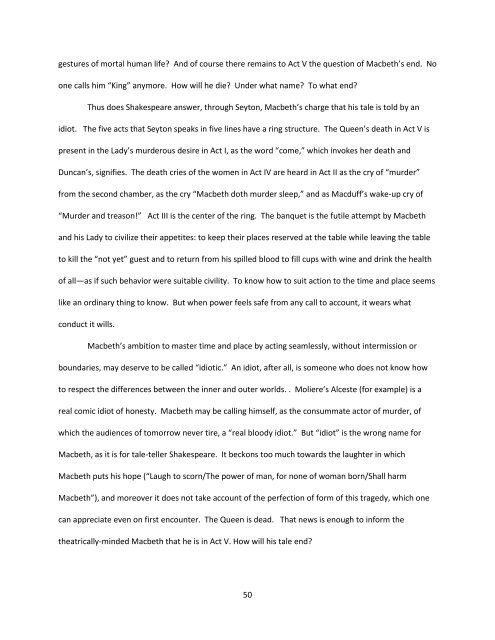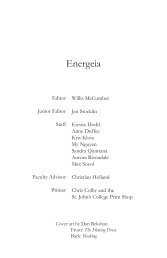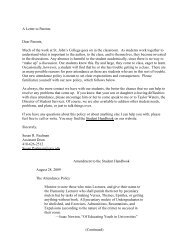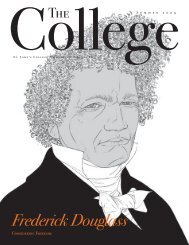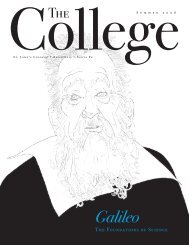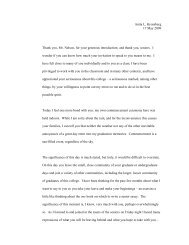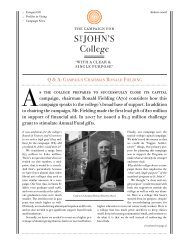âTo Meet with Macbeth,â given by tutor Louis ... - St. John's College
âTo Meet with Macbeth,â given by tutor Louis ... - St. John's College
âTo Meet with Macbeth,â given by tutor Louis ... - St. John's College
Create successful ePaper yourself
Turn your PDF publications into a flip-book with our unique Google optimized e-Paper software.
gestures of mortal human life? And of course there remains to Act V the question of <strong>Macbeth</strong>’s end. No<br />
one calls him “King” anymore. How will he die? Under what name? To what end?<br />
Thus does Shakespeare answer, through Seyton, <strong>Macbeth</strong>’s charge that his tale is told <strong>by</strong> an<br />
idiot. The five acts that Seyton speaks in five lines have a ring structure. The Queen’s death in Act V is<br />
present in the Lady’s murderous desire in Act I, as the word “come,” which invokes her death and<br />
Duncan’s, signifies. The death cries of the women in Act IV are heard in Act II as the cry of “murder”<br />
from the second chamber, as the cry “<strong>Macbeth</strong> doth murder sleep,” and as Macduff’s wake-up cry of<br />
“Murder and treason!” Act III is the center of the ring. The banquet is the futile attempt <strong>by</strong> <strong>Macbeth</strong><br />
and his Lady to civilize their appetites: to keep their places reserved at the table while leaving the table<br />
to kill the “not yet” guest and to return from his spilled blood to fill cups <strong>with</strong> wine and drink the health<br />
of all—as if such behavior were suitable civility. To know how to suit action to the time and place seems<br />
like an ordinary thing to know. But when power feels safe from any call to account, it wears what<br />
conduct it wills.<br />
<strong>Macbeth</strong>’s ambition to master time and place <strong>by</strong> acting seamlessly, <strong>with</strong>out intermission or<br />
boundaries, may deserve to be called “idiotic.” An idiot, after all, is someone who does not know how<br />
to respect the differences between the inner and outer worlds. . Moliere’s Alceste (for example) is a<br />
real comic idiot of honesty. <strong>Macbeth</strong> may be calling himself, as the consummate actor of murder, of<br />
which the audiences of tomorrow never tire, a “real bloody idiot.” But “idiot” is the wrong name for<br />
<strong>Macbeth</strong>, as it is for tale-teller Shakespeare. It beckons too much towards the laughter in which<br />
<strong>Macbeth</strong> puts his hope (“Laugh to scorn/The power of man, for none of woman born/Shall harm<br />
<strong>Macbeth</strong>”), and moreover it does not take account of the perfection of form of this tragedy, which one<br />
can appreciate even on first encounter. The Queen is dead. That news is enough to inform the<br />
theatrically-minded <strong>Macbeth</strong> that he is in Act V. How will his tale end?<br />
50


